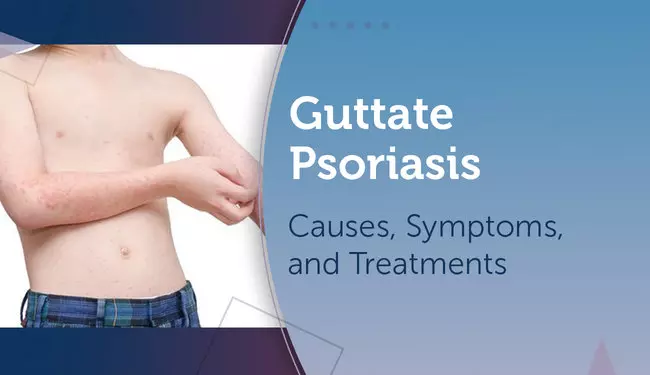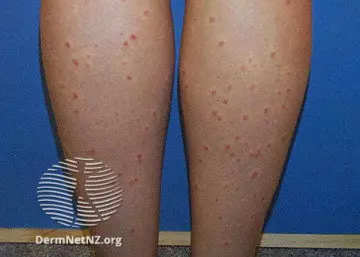
Quick Links
Resources
About MyPsoriasisTeam
Powered By






Guttate psoriasis is a form of psoriasis that primarily affects children and young adults. According to the National Psoriasis Foundation, about 8 percent of people with psoriasis develop guttate psoriasis, the second most common type after plaque psoriasis.
Small, red, scaly, teardrop-shaped spots on the arms, legs, and torso are characteristic of guttate psoriasis. Lesions typically develop suddenly, following a bacterial infection such as strep throat. Guttate psoriasis is not contagious and spots often clear with treatment, though in some people it can later return as plaque psoriasis.
The cause of guttate psoriasis is not completely understood. Like plaque psoriasis, guttate psoriasis is believed to be caused by an overactive immune system that creates inflammation and overproduces skin cells, according to the American Academy of Dermatology.
In many cases, strep throat appears to be the main trigger of guttate psoriasis. According to the National Psoriasis Foundation, other possible triggers include:
Risk factors for guttate psoriasis include a family history of skin disease. People with psoriasis in general also have a higher risk of developing psoriatic arthritis, obesity, certain eye conditions, cardiovascular disease, type 2 diabetes, and other autoimmune disorders including Crohn’s disease.
 Guttate psoriasis (DermNet NZ) |
Guttate psoriasis can appear quickly. Symptoms include tiny red bumps (called papules) that are raised, scaly, and possibly itchy. The spots typically cover the torso, arms, and legs, but can appear elsewhere on the body. Guttate lesions are not generally as thick as those of plaque psoriasis.
Diagnosis is usually made with a visual examination of lesions and a medical history. A dermatologist may order tests to confirm the diagnosis that include a throat culture and blood work to detect elevated levels of strep bacteria. A skin biopsy is sometimes performed but usually isn’t necessary.
Speak with your dermatologist if you develop guttate psoriasis after a strep throat infection.
Treatment for guttate psoriasis aims to clear the skin of lesions as long as possible. Depending on the severity of symptoms, treatments can include over-the-counter topical lotions, phototherapy, or medications that suppress the body’s immune system activity. Your dermatologist may recommend one or more of the following treatment options.
For mild guttate psoriasis covering less than 3 percent of the body, dermatologists typically recommend topical creams or ointments that help relieve itching, scaling, and redness. They include over-the-counter and prescription topical treatments (available in creams, ointments, or lotions) in combination with moisturizers.
Salicylic acid and coal tar — low-potency agents found in nonprescription creams, gels, and lotions — can help manage mild to moderate symptoms of guttate psoriasis. Cortisone or other anti-itch creams may also be recommended.
High-potency topical corticosteroids can help reduce swelling and redness by blocking inflammatory responses in the body. Steroids come in various strengths and should be used sparingly on small areas of the body for no longer than three weeks to avoid skin thinning and changes in pigmentation.
Nonsteroid prescription topicals — such as vitamin A derivative tazarotene (Tazorac) or calcipotriene (Dovonex), a synthetic form of vitamin D — are often prescribed to treat general psoriasis. Unlike steroids, however, these drugs don’t cause skin thinning.
Topical calcineurin inhibitors, such as tacrolimus (Protopic) and pimecrolimus (Elidel), suppress the immune system to control inflammation and can be used longer than steroids. Approved for atopic dermatitis, they can be prescribed off-label to treat guttate lesions in combination with steroid topicals or systemic treatments.
Light therapy, or phototherapy, is often the first-line treatment for people with moderate to severe guttate psoriasis that covers 10 percent or more of the body, according to the National Psoriasis Foundation. Narrowband ultraviolet B (UVB) light is most frequently recommended to reduce inflammation and slow the growth of skin cells.
Phototherapy treatment involves short periods of exposure to artificial UVB rays while standing inside a light box. A type of phototherapy called PUVA may also be prescribed. It combines exposure to UVA light with an oral medicine (psoralen) that makes skin more sensitive to that light.
Psoriasis symptoms typically improve or disappear in up to 90 percent of people using phototherapy. Phototherapy, however, is not for everyone. It involves multiple treatments over several weeks, can be expensive, and may not be available in all areas. Side effects include sunburn, dry skin, freckling, skin aging, and nausea or vomiting from PUVA medication. Phototherapy can also increase the risk of skin cancer, according to the American Academy of Dermatology.
Oral disease-modifying antirheumatic drugs (DMARDs) that suppress immune system activity are sometimes considered in combination with light therapy, or in cases where phototherapy is not available. These include methotrexate (Otexup) and cyclosporine taken short-term. Apremilast (Otezla), which decreases the number of molecules that cause inflammation, may also be considered for moderate or severe cases.
Biologic drugs work by altering parts of the immune system that promote inflammation. Although not a standard of care for moderate to severe guttate psoriasis, biologics show promise in controlling this form of the skin disease. The plaque psoriasis drug ustekinumab (Stelara) improved guttate psoriasis symptoms in a handful of case studies.
Other drugs that may be prescribed as a second-line treatment for guttate psoriasis include adalimumab (Humira), etanercept (Enbrel), and ixekizumab (Taltz). They’re administered by injection or infusion and are considered highly effective in reducing discolored, scaly lesions. Biologics have been known to increase the risk of infection and cancer.
To protect skin against irritation and injury, dermatologists also recommend a regular practice of home care that includes cleansing and moisturizing.
Moisturizers are an important part of any psoriasis treatment. These over-the-counter lotions, creams, and ointments help soften and remove dead skin cells. A good moisturizer can prevent psoriasis from getting worse. Use a fragrance-free moisturizer daily, after bathing, and whenever the area feels dry.
Wash skin gently with mild, fragrance-free cleansers. Avoid irritating antibacterial soaps or body washes. Adding emollients, such as bath oil or oatmeal, to the water can soothe raw, painful skin. The National Psoriasis Foundation publishes a list of approved personal care products that can also help reduce symptoms of guttate psoriasis.
There are several popular natural remedies for psoriasis, which might also provide relief for those with guttate psoriasis.
Guttate psoriasis may clear up in a few weeks or months. In some people, however, it can develop into plaque psoriasis or flare up again after another throat infection. Be sure to consult your doctor if you experience symptoms of guttate psoriasis.
By joining MyPsoriasisTeam, the social network and online support group for those living with psoriasis and psoriatic arthritis, you gain a support group more than 108,000 members strong. PsA in the feet is a frequently discussed topic.
Are you living with guttate psoriasis? Comment below or start a conversation today on MyPsoriasisTeam. You’ll be surprised how many others share similar stories.
Don’t miss the latest news, tips and treatment options.
Privacy Policy Ariel D. Teitel, M.D., M.B.A.
is the clinical associate professor of medicine at the NYU Langone Medical Center in New York. Review provided by VeriMed Healthcare Network.
Learn more about him here.
Ariel D. Teitel, M.D., M.B.A.
is the clinical associate professor of medicine at the NYU Langone Medical Center in New York. Review provided by VeriMed Healthcare Network.
Learn more about him here.
 Laurie Berger
has been a health care writer, reporter, and editor for the past 14 years.
Learn more about her here.
Laurie Berger
has been a health care writer, reporter, and editor for the past 14 years.
Learn more about her here.



We'd love to hear from you! Please share your name and email to post and read comments.
You'll also get the latest articles directly to your inbox.